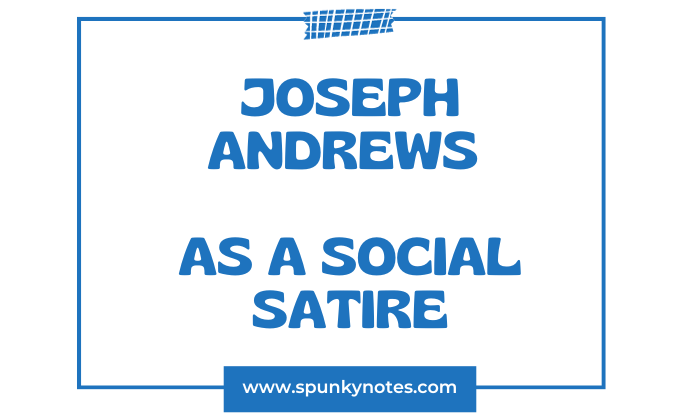
Q. Henry Fielding’s novel, Joseph Andrews, is a social satire of 18th-century England. Discuss.
Introduction
The novel criticizes rich and powerful people and the law system. It shows many rich people as having bad morals and caring only about themselves.
Fielding also challenges the rigid social hierarchy of 18th-century England. He suggests that a person’s worth should not be determined by birth and social status.
Joseph Andrews as a Social Satire
Through humor, Fielding pokes fun at the characters and institutions of his era, presenting a sharp critique of his society. His work is engaging yet highlights the following societal flaws.
- Moral Hypocrisy of the Upper Class
- Greed and Corruption
- Vulnerability of the Lower Classes
- Rural vs. Urban Dichotomy
- The Church’s Hypocrisy
- Flawed Justice System
- Pretence
1- Moral Hypocrisy of the Upper Class
In “Joseph Andrews,” the upper class’s moral hypocrisy is evident. Lady Booby, an aristocratic widow, embodies this flaw. She wants Joseph Andrews, who works for her, even though it’s not socially accepted.
She does not care about his good character and fires him when he says no to her. This dismissal reveals how powerful people could use and get rid of less powerful people without getting into trouble.
Mr. Booby, her nephew, also embodies this hypocrisy. While he marries Pamela, Joseph’s sister, for love, he often places societal standards above personal feelings. He often ignores the thoughts and feelings of people he believes are not as important as him, making quick judgments based on their social class.
Similarly, Mrs. Slipslop, Lady Booby’s servant, imitates her mistress’s behavior, proving that moral decay is not limited to the aristocracy. Her exaggerated affection for Joseph is laughable yet insightful.
They expose how deeply societal hypocrisy ran, where appearance mattered more than genuine virtue. These characters’ actions in the novel unmask the double standards and the pretense of morality among the English upper class.
2- Greed and Corruption
In “Joseph Andrews,” Mr. Wilson’s actions show the greed in legal circles. He is a lawyer who does not always play fair. Instead of helping clients, he often tricks them to get more money.
His shady ways highlight the dishonesty in the legal world of that time. Many lawyers were more interested in filling their pockets than in justice.
Fielding uses Mr. Wilson to point out this corruption. Through him, we learn that some lawyers used their power for their own good, not doing what was right. This shows that the law system in the 18th century was not working well.
3- Vulnerability of the Lower Classes
In “Joseph Andrews,” the lower classes often face hardships. Joseph, a footman, is a good example. When he turns down Lady Booby’s advances, she fires him.
The rich controlled the people with low incomes and didn’t treat them nicely. On his journey, Joseph meets many others who also struggle because of their low status. They get mistreated and overlooked by those richer than them.
Fielding uses these stories to highlight how tough life was for the lower classes. They had few rights and were at the mercy of the wealthy, who often took advantage of them without thinking twice.
4- Rural vs. Urban Dichotomy
In “Joseph Andrews,” Fielding contrasts country and city life. Joseph’s travels take him from the peaceful countryside to the busy city of London. In the countryside, people live simple, honest lives.
They value community and help one another. However, Joseph sees greed, deceit, and vice in the city. People are more selfish and focused on money and status. The city’s fast pace and temptations often lead to trouble.
Through Joseph’s experiences, Fielding shows the clear differences between rural purity and urban corruption. He suggests that the countryside offers a more genuine and moral life than the city.
5- The Church’s Hypocrisy
In “Joseph Andrews,” Fielding sheds light on the church’s flaws. Parson Trulliber, a church member, stands out. Instead of focusing on his religious duties, he is more interested in his farm and making money.
His actions show the greed that existed even within the church. Then there is Parson Adams, who, though good-hearted, is often naive and easily misled, reflecting the church’s disconnect from real-world issues.
These characters highlight the church’s hypocrisy. Fielding suggests that some church members were lost in worldly desires instead of being true moral guides. The church, which should have been a source of guidance and virtue, had its own issues.
Through the story, Fielding criticizes the church for not always living up to its teachings and for sometimes being as flawed as the society it aimed to guide.
6- Flawed Justice System
In “Joseph Andrews,” the justice system’s pitfalls are evident in how Joseph and his companions are treated. A prime example is when Parson Adams, Joseph, and Fanny travel and get into a skirmish at an inn. They are immediately assumed to be wrong without proper investigation, which shows a rush to judgment.
Another notable incident involves Parson Adams being accused of poaching. He is arrested merely on suspicion, without concrete evidence. Based on shaky grounds, the hasty action taken against Adams highlights the system’s inefficiencies and biases.
Furthermore, when Joseph is assaulted and left for dead on the roadside, the system does little to bring his attackers to justice. Instead, the focus swiftly shifts to whether Joseph was in the right or wrong, sidestepping the primary issue of his assault.
7- Pretence
In “Joseph Andrews,” Fielding exposes the facade of respectability many characters uphold. Mrs. Slipslop, Lady Booby’s servant, is a prime example.
She presents herself as a woman of moral standing, but her actions, especially her inappropriate advances towards Joseph, reveal her true character. Her pretentious speech, filled with malapropisms, further underscores the gap between her perceived and actual status.
Similarly, Lady Booby, despite her high social rank, behaves in a manner unbecoming of her status. Her relentless pursuit of Joseph, a mere footman, and her subsequent fury at his rejections peel away the layers of her supposed nobility, exposing her flawed character.
Then, there is the episode with Beau Didapper, a man of the town, who tries to kidnap and seduce Fanny. Even though he looks nice outside, he acts differently in private.
Conclusion
In “Joseph Andrews,” Joseph’s journey from the countryside to London is filled with challenges. He is wrongly accused of crimes, meets various colorful characters, and faces moral dilemmas.
Lady Booby, his former employer, tries to seduce him, but he stays true to his love, Fanny. A kind but naive clergyman, Parson Adams accompanies him, often getting into comical situations.
They encounter thieves, kind innkeepers, and deceitful individuals. Fanny’s journey to find Joseph shows her bravery. Fielding highlights the good and evil in 18th-century England through these adventures, using humor and wit to critique society.

